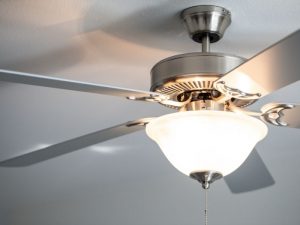You may wonder why your ceiling fan light bulbs keep burning out faster than normal light bulbs. Well, you are not the only one who has experienced it. There are several reasons for this, but the main reason is;
Fan vibration causes light bulbs to burn out quickly
Ceiling fan light bulbs burn out quickly because of the constant vibration of the fan. The vibrations can damage the filaments in the incandescent light bulbs and cause them to burn out quickly. Vibrations have this same effect on CFL and LED bulbs too.
While it is impossible to avoid this problem completely, balancing the fan blades can significantly reduce vibrations. If your fan is wobbly, make sure to balance it correctly.
Another solution is to use bulbs with heavy duty filaments. As fragile filaments are more susceptible to damage from vibrations, heavy-duty filament ones will last longer.
Although fan vibration is the likely culprit behind this problem, there are other possibilities too. Here are they;
Poor Quality of the Bulb
One common reason why light bulbs keep burning out is the poor quality of the bulb itself. Oftentimes, the bulbs used in ceiling fans are of lower quality than those used in other fixtures. Also, since the bulbs are universal, people often replace faulty ones with cheaper ones.
Also, incandescent bulbs, the common type used in ceiling fan fixtures, have a much shorter life span compared to LED and other types of light bulbs. Therefore, in comparison, it is normal to replace fan lights more often.
Using good quality light bulbs, preferably the same models that come with the fan, can prolong their use.
Loose Wiring
Loose wire connections are another common culprit behind light bulbs burning out frequently. Since even the well-balanced ceiling fans vibrate slightly, the electrical wiring to the light bulbs comes loose if not installed correctly.
If this issue of fan bulbs burning out started recently, or the light flickers, a loose electrical wire could be the most possible reason behind it. The wire could have come loose after long usage. To check the wiring, simply tighten the wires to the light fixture. Most of these lights are easy to remove to check for the wiring.
If the light fixture uses multiple bulbs, and bulbs in the same socket keep blowing out, a loose wire connection to that particular socket could be the problem. This can be tricky to solve since the wiring may not be easily accessible. In this case, try DIYing or call an electrician.

Excessive Heat
Another possible reason is overheating. Incandescent light bulbs heat up quickly, and if there is no proper ventilation, overheating can damage them. Improper insulation, restricted ventilation, or inadequate wattage can build up too much heat in the area around the light bulb, causing the filament inside the bulb and burn out prematurely.
Overheating can happen for LED bulbs too. In this case, the source of heat is the fan’s motor.
To prevent excessive heat from causing your light bulbs to burn out, use the correct wattage of light bulbs for your fixture – higher-wattage bulbs tend to get hotter and can cause overheating more quickly.
Frequent on/off cycles
Frequently turning the fan on or off puts extra strain on the bulb, reducing its lifespan significantly. It’s essential to keep in mind that not all ceiling fan light bulbs are designed to handle frequent on/off cycles. If your ceiling fan is frequently used, look for a heavy-duty light bulb, such as an incandescent bulb Halogen instead of LEDs or compact fluorescent lightbulbs (CFLs). This will help reduce the chances of your light bulb burning out prematurely.
Use of dimmer switches
For many fan models, the light fixture can be controlled independently of the fan. People often use a dimmer switch to control fan light fixtures, but if the bulbs used are not compatible with such switches, they will burn out soon.
The solution for this is either using dimmer switch-compatible light bulbs or avoiding dimmer switches.
Using the wrong type of bulb
Every ceiling fan light fixture has a specific wattage limit and wattage recommendations, and if you’re using a bulb that is too powerful, it can cause the bulb to burn out quickly. Low-wattage bulbs are not ideal for ceiling fans as they don’t provide sufficient lighting and may flicker or buzz. Also, if the bulb is too large or small, it may not fit correctly into the light fixture, which could also lead to problems. Double-check the manufacturer’s instructions and look for the recommended wattage and size to ensure that you’re using the correct bulb for your ceiling fan.
Voltage issues
Excessive voltage can cause too much current to flow through the bulb, causing it to overheat and eventually burn out. Several factors, such as an overloaded circuit, a faulty power supply, or a broken wire in the wiring system, can cause voltage problems.
If your ceiling fan is connected to an outlet sharing power with other electronics, this can cause a higher voltage draw that the light bulb was not designed to handle. You should always check the voltage requirements for any bulb you are installing and ensure it matches the power supply you are using.
